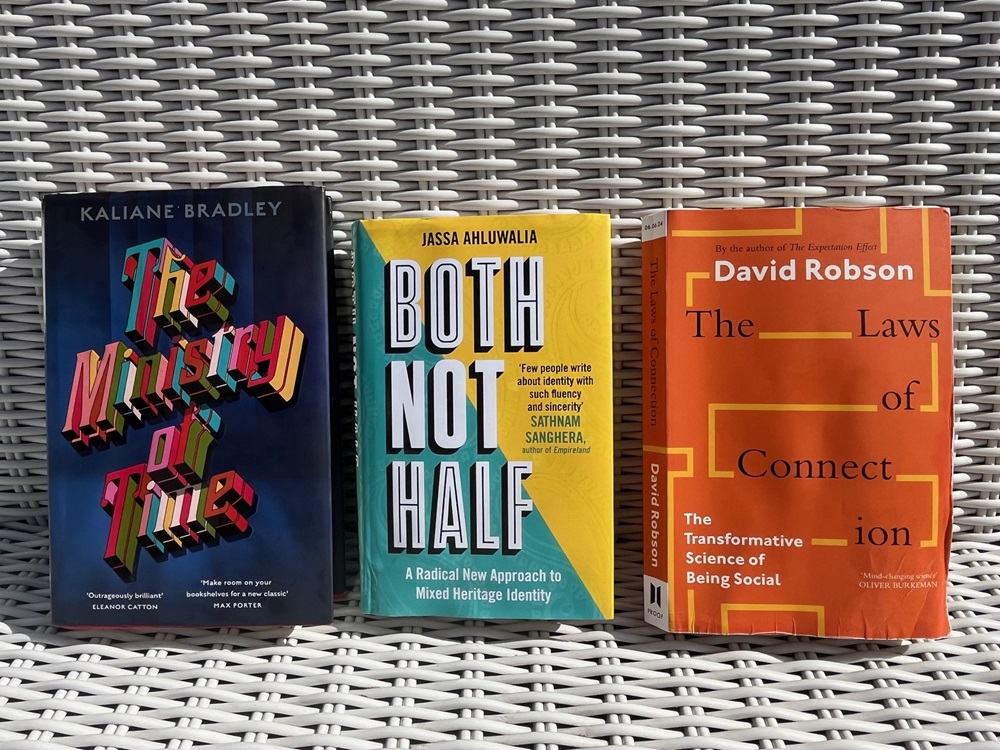Summer 2024 will always be remembered for the UK riots and the racist and Islamophobic violence that erupted across the UK. It’s at times like this that I turn to books for comfort. This round up of three of my favourite new books focuses on racism, identity and inclusion. I hope they provide food for thought as the charity sector continues supporting the communities affected.
Whilst I was on holiday in Cornwall I read The Ministry of Time by Kaliane Bradley. From the reviews I was expecting this to be a fun, odd couple romance between a Victorian explorer who has time travelled to Britain in the near future and a civil servant whose job it is to help him acclimatise and adapt to modern life. So I was surprised when I discovered that the book uses time travel as a device to explore what it means to be a refugee. This is seen through the lens of 19th century explorer Commander Graham Gore as he grapples with feminism, modern plumbing and Spotify, alongside delving into the family history of the narrator, who is the aforementioned civil servant and a woman with both Cambodian and British heritage. Her experience really resonated with me as someone with Chinese and English heritage.
The Ministry of Time is ultimately about the experience of being an immigrant in 21st century Britain, and the emotional cost of being asked to give up your culture. Through this Bradley dissects the legacy of Empire and how it still pervades so many aspects of our lives, from workplace culture to EDI programmes to climate change and relationships.
Bradley’s descriptions of the impact of assimilation and intergenerational trauma are some of the best I have ever read; they made me think long and hard about my own family history. Her writing is scattered with bombshells about racism and power. I especially loved this quote: “You don’t gain any special knowledge from being marginalised. But you do gain something from stepping outside your hurt and examining the scaffolding of your oppression.”
It’s a dark book, but it’s also funny and an unflinching look at love, acceptance and redemption. I loved this book so much that I have read it twice.There is a BBC adaptation in the works already and I can’t wait to see it.
Speaking of identity, I was excited to read Jassa Ahluwalia’s Both Not Half, which discusses the experience of having mixed heritage and how language influences identity. Ahluwalia is an actor who has appeared in Ripper Street and Some Girls. His TEDx talk about his Punjabi and White British heritage and how we need to talk about mixed heritage differently went viral when it was released in 2020, and it forms the basis of this book.
Ahluwalia argues that terms such as ‘mixed race’ are rooted in racism and that it is better to use the term ‘mixed heritage’ instead, as it opens up a conversation about culture. He explains how he used to identify as half Punjabi and half English. He now describes himself as being both Punjabi and English for these reasons: saying that you are half something can feel binary and could be perceived as a statement about being ‘less.’ The book then broadens out into a journey through other aspects of Ahluwalia’s identity, from class to religion to sexuality. In addition, he examines the history of identity, for example how national identities were invented in the 1800s as cities began to develop and traditional communities began to change.
Those with mixed heritage are the fastest-growing minority group in Britain. By the end of the century roughly one in three of the population will have mixed heritage, rising to 75 per cent by 2150. And yet being mixed heritage, and the complexity and nuances of it, are not something which I often see covered by DEI work. So Ahluwalia’s book tells us something about how to prepare for the future, but also how to develop a more effective, layered approach to anti-racism and inclusion work. It has stayed with me and has changed how I now describe my heritage.
The riots have left their mark on our society and although the news agenda has moved on, the people of colour that I have spoken to do not feel safe. So it is even more important that leaders create a sense of belonging and psychological safety in their organisations. David Robson’s The Laws of Connection is an excellent guide to how to do this. He discusses the toxicity of loneliness and why social connection is vital to our health, leading to a lower likelihood of Alzheimer’s and heart attacks. Scientific research has shown that people who feel socially connected perform better on tests of mental focus, memory and problem solving. If leaders can make belonging the cornerstone of their culture imagine the impact this would have on wellbeing, morale and performance.
Robson tells us how feeling connected nurtures creativity, improves financial sustainability and helps us be more productive.He outlines 13 principles to foster connection, from showing empathy and curiosity by asking good questions, to disagreeing constructively and finding forgiveness. I was especially moved by the chapter on the burden of keeping secrets, where Robson describes his own experience of coming out and why it’s important to offer safe spaces to others, where they feel comfortable being open and vulnerable.It’s something which leaders need to make a priority in the wake of the riots.
I hope these books offer insights to charities about the ongoing response to the riots and how we can look after each other and create stronger organisational cultures with belonging at their core.
Which books have inspired your approach to inclusion and leadership? How are you addressing these issues in your charity?

